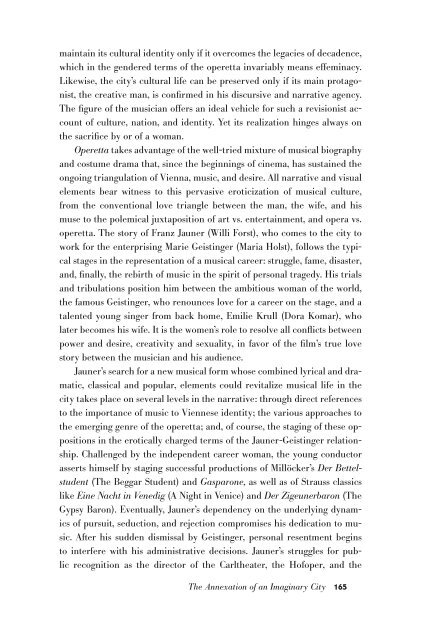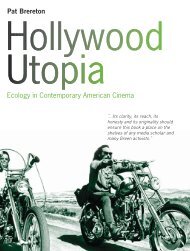Create successful ePaper yourself
Turn your PDF publications into a flip-book with our unique Google optimized e-Paper software.
maintain its cultural identity only if it overcomes the legacies of decadence,<br />
which in the gendered terms of the operetta invariably means effeminacy.<br />
Likewise, the city’s cultural life can be preserved only if its main protagonist,<br />
the creative man, is confirmed in his discursive and narrative agency.<br />
The figure of the musician offers an ideal vehicle for such a revisionist account<br />
of culture, nation, and identity. Yet its realization hinges always on<br />
the sacrifice by or of a woman.<br />
Operetta takes advantage of the well-tried mixture of musical biography<br />
and costume drama that, since the beginnings of cinema, has sustained the<br />
ongoing triangulation of Vienna, music, and desire. All narrative and visual<br />
elements bear witness to this pervasive eroticization of musical culture,<br />
from the conventional love triangle between the man, the wife, and his<br />
muse to the polemical juxtaposition of art vs. entertainment, and opera vs.<br />
operetta. The story of Franz Jauner (Willi Forst), who comes to the city to<br />
work for the enterprising Marie Geistinger (Maria Holst), follows the typical<br />
stages in the representation of a musical career: struggle, fame, disaster,<br />
and, finally, the rebirth of music in the spirit of personal tragedy. His trials<br />
and tribulations position him between the ambitious woman of the world,<br />
the famous Geistinger, who renounces love for a career on the stage, and a<br />
talented young singer from back home, Emilie Krull (Dora Komar), who<br />
later becomes his wife. It is the women’s role to resolve all conflicts between<br />
power and desire, creativity and sexuality, in favor of the film’s true love<br />
story between the musician and his audience.<br />
Jauner’s search for a new musical form whose combined lyrical and dramatic,<br />
classical and popular, elements could revitalize musical life in the<br />
city takes place on several levels in the narrative: through direct references<br />
to the importance of music to Viennese identity; the various approaches to<br />
the emerging genre of the operetta; and, of course, the staging of these oppositions<br />
in the erotically charged terms of the Jauner-Geistinger relationship.<br />
Challenged by the independent career woman, the young conductor<br />
asserts himself by staging successful productions of Millöcker’s Der Bettelstudent<br />
(The Beggar Student) and Gasparone, as well as of Strauss classics<br />
like Eine Nacht in Venedig (A Night in Venice) and Der Zigeunerbaron (The<br />
Gypsy Baron). Eventually, Jauner’s dependency on the underlying dynamics<br />
of pursuit, seduction, and rejection compromises his dedication to music.<br />
After his sudden dismissal by Geistinger, personal resentment begins<br />
to interfere with his administrative decisions. Jauner’s struggles for public<br />
recognition as the director of the Carltheater, the Hofoper, and the<br />
The Annexation of an Imaginary City 165

















